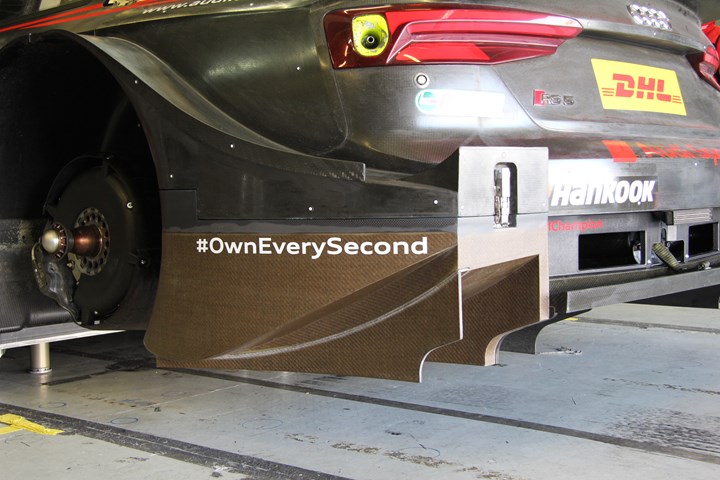German racing series shifts to natural fiber application
German racing series DTM says the shift away from carbon fibers will be more cost-efficient, improve lightweighting and reduce the organization’s ecological footprint.

DTM Bcomp natural fiber shoebox being tested by Audi. Source | Audi Sport
The German racing series Deutsche Tourenwagen Masters (DTM) reports that Bcomp (Fribourg, Switzerland), a manufacturer of lightweight solutions for the automotive industry, has been selected as a technical partner to boost sustainable lightweighting applications in motorsports. DTM says the partnership will open technical regulations to enable a material shift from carbon fibers to Bcomp’s natural fibers on mandatory composite parts for the 2020 season.
DTM says Bcomp’s powerRibs natural fiber has the same weight as the previously used carbon fiber parts, while reducing its ecological footprint, improving cost-efficiency and eliminating the risk of carbon fiber debris.
“With a high exposure to contacts, the DTM shoebox is a typical motorsport bodywork wear part that needs to be replaced or repaired after almost every race,” says Layla Wagener, sport and engineering specialist at DTM. “With Bcomp’s natural fiber technologies, we can achieve the same weight as with carbon fiber, while additionally taking advantage of the anti-splintering and environmental benefits. It is an ideal start to introduce Bcomp’s sustainable lightweighting solutions.”
Preceding the partnership, the first natural fiber DTM parts using Bcomp’s ampliTex and powerRibs fibers were successfully validated by BMW Motorsport and Audi Sport during the last DTM test in Jerez, Spain, and Vallelunga, Sicily. “Being a technical partner of the DTM enables us to showcase the full potential of our natural fiber technologies on the highest engineering level of touring car racing,” says Johann Wacht, Bcomp’s motorsport manager.
DTM says further application of natural fiber parts is in development and will be introduced by DTM and Bcomp throughout the racing season.
Related Content
-
Manufacturing the MFFD thermoplastic composite fuselage
Demonstrator’s upper, lower shells and assembly prove materials and new processes for lighter, cheaper and more sustainable high-rate future aircraft.
-
TU Munich develops cuboidal conformable tanks using carbon fiber composites for increased hydrogen storage
Flat tank enabling standard platform for BEV and FCEV uses thermoplastic and thermoset composites, overwrapped skeleton design in pursuit of 25% more H2 storage.
-
Plant tour: Albany Engineered Composites, Rochester, N.H., U.S.
Efficient, high-quality, well-controlled composites manufacturing at volume is the mantra for this 3D weaving specialist.














.jpg;maxWidth=300;quality=90)
